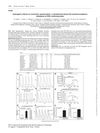12 citations,
January 1998 in “Drug safety” Finasteride helps reduce prostate size and symptoms in BPH but is less effective than terazosin and works best for larger prostates.
3 citations,
January 2022 in “Journal of neuroendocrinology” Sex hormones affect brain cells differently in males and females.
 1 citations,
August 2022 in “Biomedicines”
1 citations,
August 2022 in “Biomedicines” Dutasteride, usually used for prostate issues and hair loss, could potentially treat Amyotrophic Lateral Sclerosis (ALS) due to its neuroprotective, antioxidant, and anti-inflammatory properties, but more testing is needed.
 March 2024 in “Cell communication and signaling”
March 2024 in “Cell communication and signaling” Lack of sleep in mice leads to prostatitis by reducing certain hormones and activating an inflammatory pathway, which can be temporarily fixed with normal sleep.
 April 2018 in “Expert Opinion on Drug Safety”
April 2018 in “Expert Opinion on Drug Safety” Dutasteride is a safe and effective treatment for hair loss.
 139 citations,
December 2020 in “Cell Stem Cell”
139 citations,
December 2020 in “Cell Stem Cell” Male hormones affect COVID-19 severity and certain drugs targeting these hormones could help reduce the risk.
 10 citations,
March 1999 in “Comparative Haematology International”
10 citations,
March 1999 in “Comparative Haematology International” Androgens increase EPO production, finasteride doesn't significantly impact it.
 May 2024 in “Brazilian Journal of Hair Health”
May 2024 in “Brazilian Journal of Hair Health” Finasteride-loaded nanoparticles were successfully created for potential improved hair growth treatment.
 5 citations,
March 2019 in “International Journal of Endocrinology”
5 citations,
March 2019 in “International Journal of Endocrinology” Exercise and finasteride together improve ovary health in PCOS rats.
 75 citations,
May 1986 in “Clinics in endocrinology and metabolism”
75 citations,
May 1986 in “Clinics in endocrinology and metabolism” Male hormones are important for hair and oil gland development and can cause conditions like excessive hair growth and acne.
 32 citations,
March 2020 in “Drug Design Development and Therapy”
32 citations,
March 2020 in “Drug Design Development and Therapy” Finasteride shows promise for female hair loss, but more research needed.
1 citations,
December 2022 in “Pharmaceutics” Finasteride-loaded microemulsions can effectively enhance skin delivery for treating hair loss.
1 citations,
July 2022 in “Clinical, Cosmetic and Investigational Dermatology” Taohong Siwu Decoction may help treat hair loss by targeting multiple genes and pathways.
September 2024 in “Frontiers in Neuroendocrinology” 5-alpha reductase inhibitors may help protect the brain and gut in Parkinson's disease.
 9 citations,
February 2022 in “Biomolecules”
9 citations,
February 2022 in “Biomolecules” Drinking a lot of alcohol increases the risk of prostate cancer and can worsen the condition.
 10 citations,
February 2008 in “International Journal of Andrology”
10 citations,
February 2008 in “International Journal of Andrology” A combination of nanomilled oral testosterone and dutasteride normalized testosterone levels in men with low testosterone and is safe for short-term use.
 October 2023 in “Journal of the Endocrine Society”
October 2023 in “Journal of the Endocrine Society” A woman's excessive hair growth was linked to a rare case of high testosterone caused by a prolactin-producing pituitary tumor.
5 citations,
January 2013 in “Spatula DD - Peer Reviewed Journal on Complementary Medicine and Drug Discovery” Trigonella foenum-graecum seeds and Butea monosperma flowers help promote hair growth and reduce hair loss after chemotherapy.
1 citations,
January 2020 in “Bioscience Reports” Long-term use of finasteride in women can cause hormonal changes, DNA damage, and menstrual issues.
10 citations,
March 2019 in “Journal of neuroendocrinology” Testosterone affects stress hormone levels differently in adolescent and adult male rats.
 22 citations,
January 2006 in “International Journal of Andrology”
22 citations,
January 2006 in “International Journal of Andrology” Taking oral testosterone with finasteride or dutasteride doubles testosterone levels, and food slightly affects it.
 October 2019 in “European heart journal”
October 2019 in “European heart journal” Androgen-deprivation therapies increase the risk of certain heart conditions, but testosterone treatment may help.
 10 citations,
October 2020 in “Microscopy and Microanalysis”
10 citations,
October 2020 in “Microscopy and Microanalysis” Resveratrol helps prevent finasteride-induced damage in male rats, improving reproductive function.
 1 citations,
August 2023 in “Andrology”
1 citations,
August 2023 in “Andrology” Finasteride changes hormone levels and certain proteins in rats, but these effects can be reversed after stopping the drug.
 October 2023 in “Recent Trends in Pharmaceutical Sciences and Research”
October 2023 in “Recent Trends in Pharmaceutical Sciences and Research” The paper concludes that animal models help in understanding hair loss causes and developing new treatments.
 11 citations,
July 2015 in “Gene”
11 citations,
July 2015 in “Gene” DHT affects bone growth by altering gene activity in osteoblasts, potentially complicating steroid use.
 8 citations,
February 2010 in “Journal of Dermatology”
8 citations,
February 2010 in “Journal of Dermatology” A topical treatment safely and effectively reduced acne by causing targeted cell death in sebaceous glands without side effects.

Crinum asiaticum extract and norgalanthamine may promote hair growth by blocking an enzyme linked to hair loss and a pathway that stops hair growth.
 7 citations,
May 1978 in “International Journal of Dermatology”
7 citations,
May 1978 in “International Journal of Dermatology” Recent hair loss research shows some progress, especially in understanding male pattern baldness, but effective treatments for many types of hair loss are still lacking.
 29 citations,
February 2007 in “Hormone and metabolic research”
29 citations,
February 2007 in “Hormone and metabolic research” Blocking the androgen receptor in skin cells reduces their growth response to male hormones, suggesting a possible treatment for skin conditions linked to androgens.





















